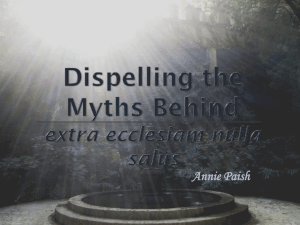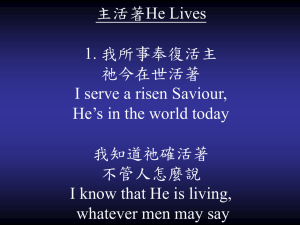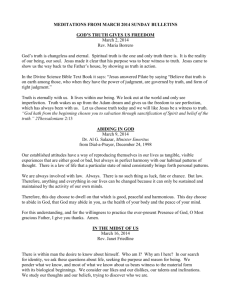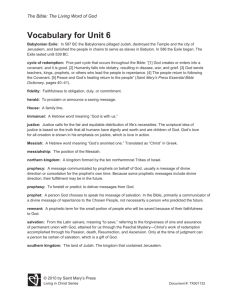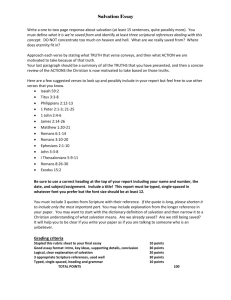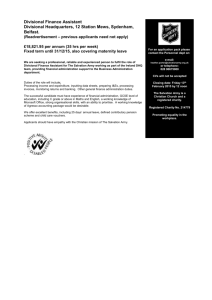Salvation Official Texts
advertisement
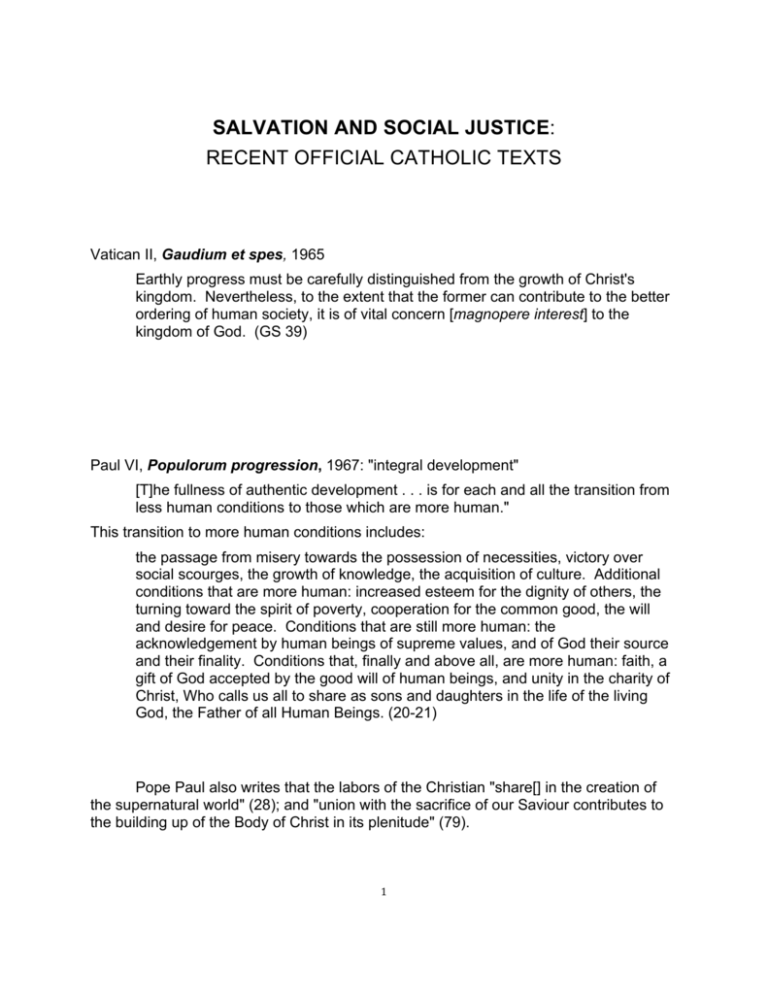
SALVATION AND SOCIAL JUSTICE: RECENT OFFICIAL CATHOLIC TEXTS Vatican II, Gaudium et spes, 1965 Earthly progress must be carefully distinguished from the growth of Christ's kingdom. Nevertheless, to the extent that the former can contribute to the better ordering of human society, it is of vital concern [magnopere interest] to the kingdom of God. (GS 39) Paul VI, Populorum progression, 1967: "integral development" [T]he fullness of authentic development . . . is for each and all the transition from less human conditions to those which are more human." This transition to more human conditions includes: the passage from misery towards the possession of necessities, victory over social scourges, the growth of knowledge, the acquisition of culture. Additional conditions that are more human: increased esteem for the dignity of others, the turning toward the spirit of poverty, cooperation for the common good, the will and desire for peace. Conditions that are still more human: the acknowledgement by human beings of supreme values, and of God their source and their finality. Conditions that, finally and above all, are more human: faith, a gift of God accepted by the good will of human beings, and unity in the charity of Christ, Who calls us all to share as sons and daughters in the life of the living God, the Father of all Human Beings. (20-21) Pope Paul also writes that the labors of the Christian "share[] in the creation of the supernatural world" (28); and "union with the sacrifice of our Saviour contributes to the building up of the Body of Christ in its plenitude" (79). 1 2 CELAM, Medellín, 1968 In Salvation History, the divine work is an action of integral liberation and human development at every level (Med. “Justice,” 4). They write that the Christian message offers people "the possibilities of full liberation, the riches of integral salvation in Christ our Lord." Rejecting "simplistic confusions or identifications," the bishops nonetheless underline the profound unity which exists between God's plan of salvation realized in Christ, and the aspirations of man; between the history of salvation and human history; . . . between the supernatural gifts and charismas and human values. (Med “Catechesis” 4; cf. ibid. 17, “Liturgy” 4) 3 4 Synod of Bishops, Justice in the World, 1971. Action on behalf of justice and participation in the transformation of the world [are] . . . a constitutive dimension of the preaching of the Gospel, or, in other words, of the Church's mission for the redemption of the human race and its liberation from every oppressive situation. (JW 6) The "Declaration" of the Synod on Evangelization, 1974, spoke of "integral salvation or complete liberation of human beings and of peoples," "the total salvation of human beings or rather their complete liberation," "the true and complete liberation of all humans, groups and peoples," and the need "to eliminate the social consequences of sin which are translated into unjust social and political structures."7 7 "A Declaration from the Synod," Origens 4 (1974):308. 5 Paul VI Evangelii nuntiandi, 1975 "As the kernel and center of His Good News," wrote the pope, Christ proclaims salvation, this great gift of God which is liberation from everything that oppresses human beings but which is above all liberation from sin and the Evil One, in the joy of knowing God and being known by Him, of seeing Him, and of being given over to Him. (EN 9; cf. 18, 31) CELAM, Puebla, 1979 The Puebla document affirms the need for "integral liberation" (see 141, 475, etc.). The unusual expression "integral salvation" has dropped from sight. It says "Christian liberation" has two inseparable elements: The first is liberation from all the bondage of personal and social sin, from everything that tears apart the human individual and society and whose source is egotism, the mystery of iniquity. The second element is liberation for progressive growth in being through communion with God and other human beings; this reaches its culmination in the perfect communion of heaven . . . . This liberation is gradually being realized in history, in our personal history and that of our peoples. It takes in all the different dimensions of life: the social, the political, the economic, the cultural, and all their interrelationships. (482-83) The bishops declare in striking fashion that "lay people . . . are pledged to the construction of the Kingdom in its temporal dimension" (787). 6 7 Congregation for the Doctrine of the Faith, Instruction on Christian Freedom and Liberation, 1986 Salvation and earthly liberation "do not belong to the same order". God's kingdom (or reign) corresponds to "eternal life", while "earthly progress" corresponds to "temporal life" (60). The "supernatural order of salvation and the temporal order of human life" are two distinct, if inseparable, "spheres" (80). Salvation corresponds to the "transcendent order" and the "city of God;" liberation in the "temporal order" corresponds to the "earthly city." "The salvific dimension of liberation cannot be reduced to the socio-ethical dimension, which is a consequence of it" (71). 8 9 We know that Jesus came to bring integral salvation, one which embraces the whole person and all humankind, and opens up the wondrous prospect of divine filiation" (RM 11). At the beginning of his ministry [Jesus] proclaimed that he was "annointed . . . to preach good news to the poor" (Lk 4,18). To all who are victims of rejection and contempt Jesus declares: "Blessed are you poor" (Lk 6,20). . ... The liberation and salvation brought by the Kingdom of God come to the human persons in their physical and spiritual dimensions. . . . John Paul continues: The Kingdom aims at transforming human relationships; it grows gradually as people slowly learn to love, forgive and serve one another. Jesus sums up the whole Law, focusing it on the commandment of love . . . . The Kingdom's nature, therefore, is one of communion among all human beings--with one another and with God. The Kingdom is the concern of everyone: individuals, society, and the world. Working for the Kingdom means acknowledging and promoting God's activity, which is present in human history and transforms it. Building the Kingdom means working for liberation from evil in all its forms. In a word, the Kingdom of God is the manifestation and the realization of God's plan of salvation in all its fullness. (RM 14-15) 10 11 John Paul II, Centesimus annus, 1991 [N]o political society . . . can ever be confused with the Kingdom of God … temporal societies . . ., as the adjective indicates, belong to the realm of time, with all that this implies of imperfection and impermanence. The Kingdom of God, being in the world without being of the world, throws light on the order of human society, while the power of grace penetrates that order and gives it life. (CA 25) CELAM, Santo Domingo, 1992 The Kingdom of God is "communion among all human beings--with one another and with God." Jesus died and rose "to free us from sin and all its consequences" (SD 27; emphasis added). The "consequences" of sin would presumably include oppressive social structures, but the inference is not made. 12 13 Pontifical Council for Justice and Peace, Compendium of the Social Doctrine of the Church, 2004. Salvation, which the Lord Jesus obtained “at a price” (1 Cor 6:20; cf. 1 Pet 1:18-19), is achieved in the new life that awaits the righteous after death, but it also permeates this world in the realities of the economy and labour, of technology and communications, of society and politics, of the international community and the relations among cultures and peoples. “Jesus came to bring integral salvation, one which embraces the whole person and all mankind, and opens up the wondrous prospect of divine filiation” (1, citing RM 11;cf. 3). The salvation offered in its fullness to human beings in Jesus Christ . . . is salvation for all people and of the whole person: it is universal and integral salvation. It concerns the human person in all his dimensions: personal and social, spiritual and corporeal, historical and transcendent. It begins to be made a reality already in history . . . . Its completion, however, is in the future . . . . (38; emphasis in orig.) God, in Christ, redeems not only the individual person but also the social relations existing between human beings. (52; emphasis in orig.) In its ground-breaking chapter on the environment, the Compendium affirms: The definitive salvation that God offers to all humanity through his own Son does not come about outside of this world. While wounded by sin, the world is destined to undergo a radical purification (cf. 2 Pet 3:10) that will make it a renewed world (cf. Is 65:17, 66:22; Rev 21:1), finally becoming the place where “righteousness dwells” (2 Pet 3:13). (453). * * * In this survey of official documents, we can trace a hesitant, interrupted development that more and more clearly affirms the “integral” nature of the salvation which God is working in Christ. Can it be that, after 2000 years of Christianity, the Catholic Church is only now, thanks to the Council and the cry of the world’s poor, overcoming a kind of “privatization” of salvation that took hold under Platonizing influence during the Patristic era and returning to the more biblical understanding of salvation? 14

